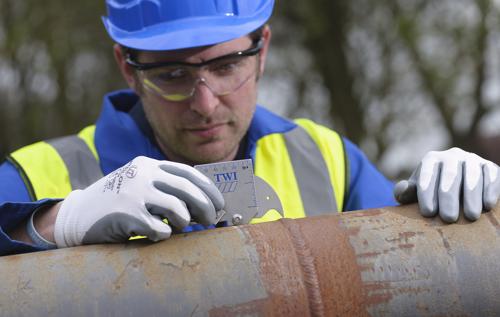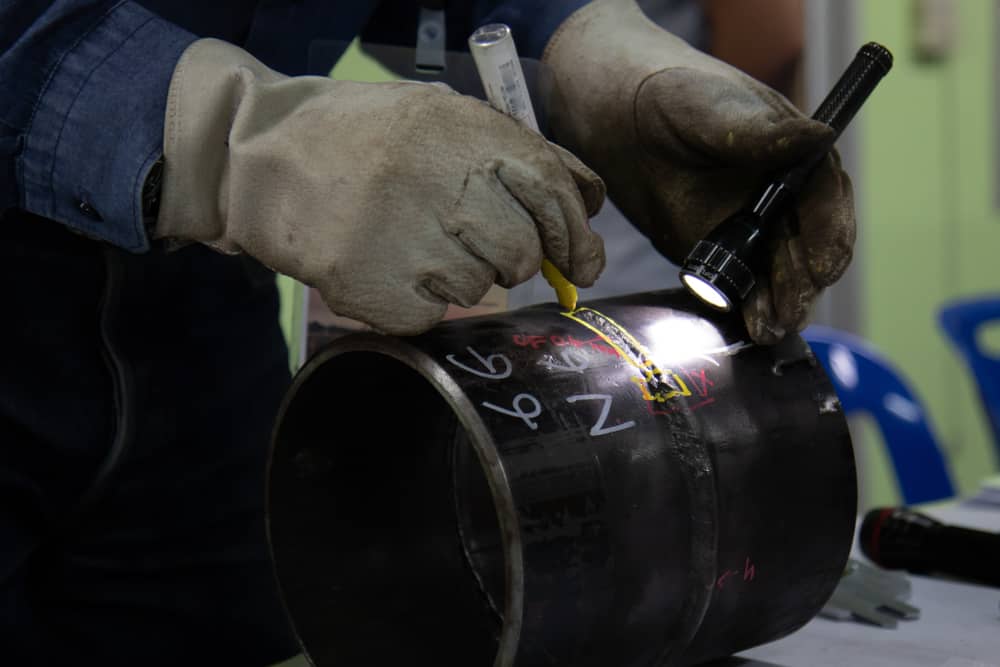The Effect of Rigorous Welding Inspection on Industry Specifications: Supporting Security, Reliability, and Conformity Throughout Various Fields
The duty of extensive welding examination is progressively acknowledged as a vital element in enhancing sector standards, where conformity, safety and security, and dependability take precedence throughout varied industries. By making sure consistency to developed guidelines, such as those stated by AWS and ISO, these inspections not only reduce threats however likewise grow a sense of accountability amongst experts. However, as industries advance and face new obstacles, the ramifications of these techniques may prolong past plain conformity. What transformations might we anticipate in welding methodologies as the need for high quality and security escalates?
Relevance of Welding Evaluations
Recognizing the critical function of welding assessments in maintaining top quality and safety and security criteria, market specialists focus on these analyses to guarantee structural stability. Welding assessments act as an essential checkpoint in the manufacture process, recognizing issues that could endanger the sturdiness and safety of bonded frameworks. By systematically evaluating welds, assessors can discover concerns such as incomplete penetration, porosity, and fractures, which might not be noticeable to the nude eye.
The importance of these evaluations prolongs past mere conformity; they are necessary for securing lives and protecting financial investments. In vital markets such as aerospace, building and construction, and manufacturing, a solitary damaged weld can cause catastrophic failures, resulting in both financial loss and human casualties. Carrying out rigorous examination methods alleviates these dangers and improves total job dependability.
In addition, constant welding examinations cultivate a culture of high quality throughout companies, urging welders to stick to ideal practices and keep high requirements in their job. This dedication to top quality not just enhances operational efficiency however likewise strengthens the reputation of business within their particular industries. Therefore, welding inspections are indispensable in promoting security, reliability, and compliance throughout different sectors.
Trick Sector Requirements and Regulations
The framework of welding evaluations is underpinned by a durable set of market requirements and guidelines that control techniques across various fields. Key institutions, such as the American Welding Culture (AWS) and the International Company for Standardization (ISO), establish guidelines that ensure high quality and security in welding operations. AWS D1.1 lays out important demands for welding steel structures, while ISO 3834 defines quality needs for fusion welding.
In enhancement to these certain standards, sector policies like the American National Standards Institute (ANSI) and Occupational Safety and Health Administration (OSHA) mandates further enhance conformity by setting safety methods and functional best techniques. These regulations are crucial in sectors such as aerospace, construction, and manufacturing, where welding honesty is extremely important.
Furthermore, sector-specific requirements, such as those from the American Society of Mechanical Designers (ASME) for stress vessels, offer added layers of scrutiny to guarantee that welds satisfy rigorous safety and performance requirements. Adherence to these standards not just facilitates governing conformity but also fosters a society of quality and reliability throughout the welding sector, inevitably safeguarding public well-being and boosting operational performance.

Benefits of Compliance and Dependability
Regularly adhering to sector requirements and policies in welding inspections yields significant benefits, improving total integrity and performance. The foremost advantage is the assurance of quality in bonded joints, which directly contributes to the safety of structures and tools. Conformity with established criteria minimizes the danger of failure and devastating occurrences, thereby protecting both human life and useful possessions.
Additionally, organizations that prioritize strenuous welding assessments foster a society of liability and professionalism and reliability. This commitment not just boosts the reputation of the company yet likewise instills confidence in clients and stakeholders relating to the stability of product or services. Reliable welding procedures lead to this website minimized costs connected with rework, repairs, and potential legal responsibilities coming from below average handiwork.
Furthermore, maintaining compliance with industry criteria assists in smoother regulatory interactions, as organizations can conveniently demonstrate adherence to essential methods (Welding Inspection Gilbert Arizona). This positive strategy can result in advantageous collaborations and possibilities within the sector, in addition to access to brand-new markets
Obstacles in Welding Examination
Navigating the intricacies of welding inspection provides a myriad of obstacles that can prevent compliance with industry standards. The absence of standard training for assessors can result in diverse analyses of assessment standards, which may compromise security and integrity.
Another obstacle exists in the accessibility of sophisticated evaluation tools - Welding Inspection Gilbert Arizona. While technologies such as ultrasonic screening and radiography can improve discovery capacities, their execution may be limited by price or schedule, specifically in smaller sized operations. This disparity can cause a reliance on less effective assessment approaches, enhancing the danger of unseen problems
In addition, the hectic nature of contemporary production commonly pressures inspectors to prioritize rate over thoroughness, possibly neglecting critical issues. Last but not least, governing compliance can be daunting as a result of the progressing nature of market requirements, leaving companies battling to stay on top of the most up to date needs. These challenges necessitate constant renovation in inspection practices to make sure the integrity of welded frameworks across various sectors.
Future Trends in Welding Practices
Arising technologies and developing approaches are established to change welding techniques in the coming years. Improvements in automation, such as robotic welding systems, are getting grip, boosting accuracy and performance while minimizing human mistake. These systems will not only speed up manufacturing however additionally facilitate constant quality assurance, attending to some of the challenges encountered in hand-operated welding.
Furthermore, the assimilation of expert system (AI) and artificial intelligence right into welding processes is positioned to transform evaluation and monitoring. Real-time data analytics will certainly make it possible for anticipating maintenance, permitting for positive interventions that lower downtime and boost safety and security. Moreover, enhanced truth (AR) and digital truth (VIRTUAL REALITY) technologies are coming to be critical in training welders, giving immersive experiences that boost ability growth without the threats connected with conventional methods.
Sustainability is visite site also an essential fad, as sectors look for greener practices. The fostering of environmentally friendly materials and techniques, alongside energy-efficient equipment, will likely become common. As industries adapt to these changes, the emphasis will certainly shift towards better conformity with safety and security and environmental policies, making certain that welding methods not only fulfill existing standards but likewise lead the way for a safer and even more sustainable future.

Final Thought
In conclusion, rigorous welding examinations dramatically improve market requirements by ensuring safety, integrity, and conformity across numerous industries. By methodically identifying issues and adhering to developed standards, these assessments mitigate dangers connected with structural failings. The promotion of liability amongst welders brings about greater top quality outcomes, cultivating trust within neighborhoods. As markets continue to focus on functional integrity, the importance of complete assessments will just increase, ultimately profiting organizations and society at large.
The duty of strenuous welding examination is progressively recognized as a crucial component in improving industry standards, where dependability, conformity, and safety and security take priority across diverse fields. Thus, welding inspections are essential in advertising security, integrity, and conformity throughout numerous sectors.
Secret organizations, such as the American Welding Culture (AWS) and the International Organization for Standardization (ISO), develop standards that ensure high quality and security in welding procedures. AWS D1.1 details essential needs for welding steel frameworks, while ISO 3834 specifies quality requirements for blend welding.
In verdict, rigorous welding assessments significantly boost market standards by making certain safety, integrity, and continue reading this compliance throughout different markets.
Comments on “Maximize Your Welding Quality with Specialist Inspection Services in Gilbert Arizona”